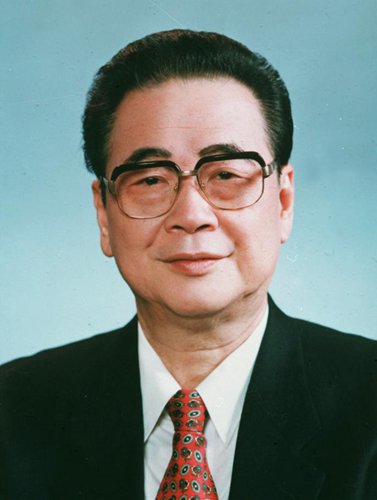HOME >> CHINA
Li Peng, former chairman of NPC Standing Committee, dies at 91
Source:Global Times Published: 2019/7/23 21:53:40 Last Updated: 2019/7/24 3:24:56

Portrait of Li Peng, former chairman of the National People's Congress Standing Committee. Li died of illness in Beijing at the age of 91 at 11:11 pm Monday, an official statement said Tuesday. (Photo: Xinhua)
Li Peng, former chairman of the National People's Congress Standing Committee, died of illness in Beijing at the age of 91 at 11:11 pm Monday, an official statement said Tuesday.
In a solemn declaration, the Central Committee of the Communist Party of China (CPC), the Standing Committee of the National People's Congress, the State Council and the National Committee of the Chinese People's Political Consultative Conference said Li was an outstanding member of the Party, long-tested loyal communist fighter, outstanding proletariat revolutionary, politician and a remarkable leader of the Party and the country, the Xinhua News Agency reported.
Li served as the member of the 12th Political Bureau of the Communist Party of China Central Committee, secretary of the CPC Secretariat, a member of the 13th, 14th and 15th Political Bureau, premier and chairman of the Standing Committee of the Ninth National People's Congress.
Born in 1928 in Chengdu, Southwest China's Sichuan Province, Li came from a revolutionary family and dedicated himself as a revolutionary at an early age.
In March 1941, he went to Yan'an - a former revolutionary base - to participate in revolutionary work and joined the Party in 1945.
During the War of Liberation (1945-1949), he was called by the Party to the front line and served as a technician of an electric company, a worker in an oil factory and the secretary of the Party branch.
In September 1948, he was arranged by the Party to study in the Soviet Union, and after coming back in 1955, he volunteered to work in lower-level departments where he served as director and chief engineer of power plants.
He underwent an impact during the Cultural Revolution (1966-76) but always adhered to the principle of Party spirit, seeking truth from facts. Since April 1979, he served as Party chief of the North China Electric Power Administration, minister and Party chief of the Ministry of Power Industry and creatively implemented the strategy of "power is priority."
Li had made a great contribution to the country's power plant construction, production and power grid management and was an outstanding leader of China's power industry and an important pioneer of nuclear power.
Starting in June 1983, Li served as vice premier of the State Council. In September 1985, he was elected as a member of the Political Bureau of the CPC Central Committee and secretary of the Central Secretariat, in charge of energy, transportation and key construction projects.
In April 1988, he was appointed premier of the State Council and resolutely implemented the policy of deepening reforms, exploring new methods for macroeconomic regulation and control of the national economy, which helped push China's economy out of the predicament and enter a new period of development.
In the political turmoil of 1989, under the strong support of the older generation of proletarian revolutionaries represented by Comrade Deng Xiaoping, Li held a clear stance. Together with most of the comrades of the Political Bureau of the CPC Central Committee, Li took decisive measures to stop the unrest and quell the counter-revolutionary riots, and stabilized the domestic situation and played an important role in this major struggle concerning the future of the Party and the country.
In October 1992, Li was re-elected as a member of the Political Bureau of the CPC Central Committee and a Standing Committee member. In March 1993, he was once again appointed as premier of the State Council. He actively supported, publicized and implemented Deng Xiaoping's ideological ideas of reform and opening-up, accelerated the pace of reform of the socialist market economic system, and strengthened and improved macroeconomic regulation and control.
In March 1998, at a meeting of the Ninth National People's Congress, he was elected as the chairman of the NPC Standing Committee.
Working in the central government, Li was devoted to the fields of science and technology, education, environmental protection, diplomacy and the national defense industry. He organized and participated in a large number of fruitful bilateral and multilateral diplomatic activities, making important contributions to the creation of a new all-round diplomatic structure. He also implemented the "one country, two systems" policy and led the work of returning Hong Kong and Macao to the motherland.
He also played an important role in the scientific and democratic decision-making and construction of the Three Gorges Project and actively supported the development of China's manned spaceflight.
Li Peng was an important pioneer, loyal practitioner and active promoter of China's socialist market economic system and an important leader in the building of socialist democracy and the rule of law with Chinese characteristics. Li was also deeply affectionate to people in need and attached great importance to poverty alleviation. He was very concerned about laid-off workers in state-owned enterprises.
After retiring from a leadership position in 2003, Li firmly supported the Party Central Committee with Comrade Hu Jintao as General Secretary, the Party Central Committee with Comrade Xi Jinping as the core, the building of a clean and honest government and the fight against corruption.
RELATED ARTICLES:
Posted in: POLITICS